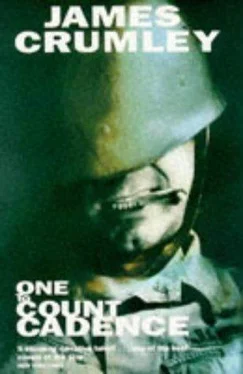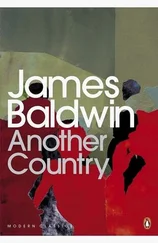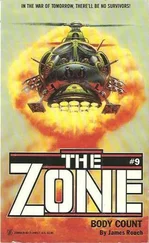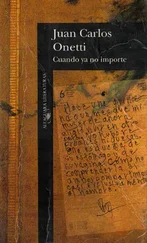James Crumley - One to Count Cadence
Здесь есть возможность читать онлайн «James Crumley - One to Count Cadence» весь текст электронной книги совершенно бесплатно (целиком полную версию без сокращений). В некоторых случаях можно слушать аудио, скачать через торрент в формате fb2 и присутствует краткое содержание. Жанр: Триллер, на английском языке. Описание произведения, (предисловие) а так же отзывы посетителей доступны на портале библиотеки ЛибКат.
- Название:One to Count Cadence
- Автор:
- Жанр:
- Год:неизвестен
- ISBN:нет данных
- Рейтинг книги:3 / 5. Голосов: 1
-
Избранное:Добавить в избранное
- Отзывы:
-
Ваша оценка:
- 60
- 1
- 2
- 3
- 4
- 5
One to Count Cadence: краткое содержание, описание и аннотация
Предлагаем к чтению аннотацию, описание, краткое содержание или предисловие (зависит от того, что написал сам автор книги «One to Count Cadence»). Если вы не нашли необходимую информацию о книге — напишите в комментариях, мы постараемся отыскать её.
One to Count Cadence — читать онлайн бесплатно полную книгу (весь текст) целиком
Ниже представлен текст книги, разбитый по страницам. Система сохранения места последней прочитанной страницы, позволяет с удобством читать онлайн бесплатно книгу «One to Count Cadence», без необходимости каждый раз заново искать на чём Вы остановились. Поставьте закладку, и сможете в любой момент перейти на страницу, на которой закончили чтение.
Интервал:
Закладка:
Morning settled himself for two months, though he had the money in the bank, but the city called his mother. It seemed they'd rather have the money than Mrs. Morning's son. She paid the fine that afternoon, and as she walked out to the street with him, she asked, "Joe, Joe, what are you going to do next? What are you going to do?" He walked away without speaking.
Back in his room he found a note from the assistant dean of men, asking him to leave school. Morning ran still stinking and dirty to the dean's office up the quiet, pleasant, shaded hill, but the dean refused to see him, saying, in a precise Tidewater voice, You're not one of our students; our students are Southern gentlemen; please leave my office.
"Southern gentlemen suck cock," he said, and left the office.
He drank the rest of the afternoon in the cool basement. The chapter president sent a pledge to tell Mr. Morning to please move out of the room, but Mr. Morning sent the pledge back up to tell Mr. President to come down to try to make him do anything. Mr. President didn't come, but the vice-president did: Jack, Morning's high school buddy buggered by the two farmers that night after they had lost the state championship. He stood in the open door, his face composed, ready for the pitch, acting as if he had forgotten the hate of that night, acting as if he were big enough, as he had said, to forgive and forget, stood there in loafers, gray slacks, a crew-neck sweater, for the winter chill still clung in Morning's basement though spring had come two weeks before.
"Joe, boy, what's the matter with you? Where did you go wrong?" He had been taking business psychology. "You came down here a football star, a stable, straight, clean guy. Then you quit football, the thing you do best of all, calling it stupid, throwing away all those hours of intense preparation. Boy, you better believe, if I could have played as well as you, I would have never quit. But you quit, threw all that God-given talent away. Then you moved down in this dirty basement, down to this damp dirty room with all your fine library of books stinking with mold, and this place stinks like a… a… a nigger whorehouse," he said as Morning tossed a pair of stained panties at his feet. "You bring girls down here, and to the parties, you wouldn't want your mother to meet. And you haven't had a hair cut, till now, since God knows when. And you sit down in Mickey's with those damned pinkos. Joe, I don't know, I just don't know. I know you're good inside, but the things the brothers say about you. Sometimes it hurts me real bad to hear them." While he talked, Jack had been carefully removing mildewed books and dirty clothes from a chair. He sat down, clasped his hands in front of a knee, and said, "And this hurts me most of all, Joe. The chapter voted you out this morning. Mind you, we can't vote you out of the national body. I mean once you are a member of this fraternity, you are a member for life, just like when you joined the church. But they can vote you out of the house. I talked for you, but in a case like this an officer just has one vote, too. It really hurts me, Joe. We been together a long time. I just don't know."
"Morning out in the morning," he chanted. "Tell my brethren I'll be come 'fore daylight charms their ruddy cheeks. You're gonna make a wonderful junior executive, Jack, you know that?"
"Joe, boy, what's gone wrong?" Jack asked again, his voice and face soft in professional concern. He fooled a drunk Morning.
So Morning tried to answer him as he lay back among the twisted, dirty sheets, looking vacantly up at the poster of an intent Lenin pasted on the low ceiling, but after a moment when he looked over at Jack's bored, dumb face, he snorted, then said with a smile, "Jack, baby, let's talk about you. I mean what's wrong with you, son? I know how you acted when them farm boys corn-holed you, I remember that, but they told me you loved it, and wouldn't let them stop. And your roommate been looking kinda peaked lately…"
"You son of a bitch," Jack said, standing up. "You bastard, I should have killed you that night."
"That's right, bugger, 'cause you sure as hell can't do it now. They fucked the guts out of you that night."
Jack sought the dirtiest curse he could think of: "You damned Communist."
Morning laughed and laughed, wild, happy roars that drove Jack from the room, across the basement, and up the stairs, and might still drive him wherever he may be. "Better Commie than queer, Jackshit." He laughed until in that quickly, for him, vanishing point between pleasure and pain, he found tears falling on his dirty hands, sobs raw in his throat, and a great lonely hole growing inside, the hole he drank into all the night long.
The next morning he felt, as he always did when chance laid him open to the world's fateful arrows and errors, that not only his civil, but even more his moral rights had been played with fast and loose by the minor officials of the various legalities he was subject to, fraternal, academic, municipal. In his drunken way he was going to demand redress, even if that redress would cost him in the same careless way: he was born to be a loser. Loser or not, though, he presented himself before the steps of the college administration building at eight o'clock in the morning, neatly dressed, shaved, clean, wearing the slacks, sweater, loafer uniform of his fellow men, and carrying a neatly lettered sign which said simply, as Morning said all his days, I PROTEST, meaning merely that he was protesting the world's treatment of him.
The administration had learned from other protests the best defense: they quietly, calmly ignored him in the way a father ignores his errant infant son. The administration was also in the process of ignoring four young Negroes who came each day with signs to protest the segregation rules of the college. The administration, adept at ignorance, also paid no mind to the eight or ten football players who appeared each morning at ten o'clock to formally spit on the Negroes who, if they blinked at this, were left curled in silent pain on the clean sidewalk, or dropped on the carefully clipped grass, or stretched over a neat hedge. But this was to be a different morning.
Just as the first Negro fell, the tall lean hungry end from north Alabama who had hit him found himself falling as Joe Morning landed square with both feet in the middle of his back. Morning became all feet and elbows, his frenzy the madness of righteousness, his strength that of surprise and holy anger, and the infidels fell about him in waves, and if he could have them away from his ribs, he might have stood them off until sweet darkness. As it was, he made them forfeit such an unholy price for his defeat that they left the other three Negroes alone that day, and from that day let the Negroes protest in peace.
So for the second time in three days, Morning woke beaten and bleeding slightly on that thin mattress, which still held the stink of his waste, bound and chained again, though on his back this time. Ah, even the fuzz is wearing thin, growing soft, he thought as he woke, and smiled, then touched his tongue to the stiff stitches in his split lip. Holy rage had eased the bitterness. He felt as clean as the lamb, washed in his own blood, but clean nonetheless, and he sang happy songs until he was released at five.
A civil-rights organization had bailed him out, and a sweet-faced, collegiate-looking cat from Cornell thanked him for his zeal and love, but chided him for resorting to violence, then bought him a beer. Partly because he wanted to throw it at his mother, partly because he needed a place to rest, but mostly because he was enchanted by this soft-spoken chocolate cat with a touch of a Yankee twang, Morning moved with the Negro into a small room off the war room in the basement of a Negro church. "Basements again," Morning said, "Always the lower depths for me," with laughter. He refused at first to even allow that non-violence had any positive possibilities; his plan was to bring the bluebellies back down the Mississippi, then let them march dreadfully to the sea, burning crops of white men in their wake. But Richard, the Negro, refused even to allow Morning to sing with them until he at least intellectually acknowledged that non-violence was the way, for now. So Morning did, mentally preparing himself for being spat upon and called niggerlover, but Richard sent him to a man in East St. Louis who then sent Morning and his guitar and his discontent off with a fund-raising group around Mid-Western and Western college campuses. So Morning sang with a Southern accent, and worked, and lived off checks sent secretly by his father instead of taking expenses from the organization, and he worked well except for a few lost weekends, or week days, depending on his moods. It was on one of these dark times, wandering about hilly San Francisco in the fog, that he stepped into the nightclub where sang the man called Linda Charles, and first acknowledged his fear.
Читать дальшеИнтервал:
Закладка:
Похожие книги на «One to Count Cadence»
Представляем Вашему вниманию похожие книги на «One to Count Cadence» списком для выбора. Мы отобрали схожую по названию и смыслу литературу в надежде предоставить читателям больше вариантов отыскать новые, интересные, ещё непрочитанные произведения.
Обсуждение, отзывы о книге «One to Count Cadence» и просто собственные мнения читателей. Оставьте ваши комментарии, напишите, что Вы думаете о произведении, его смысле или главных героях. Укажите что конкретно понравилось, а что нет, и почему Вы так считаете.












